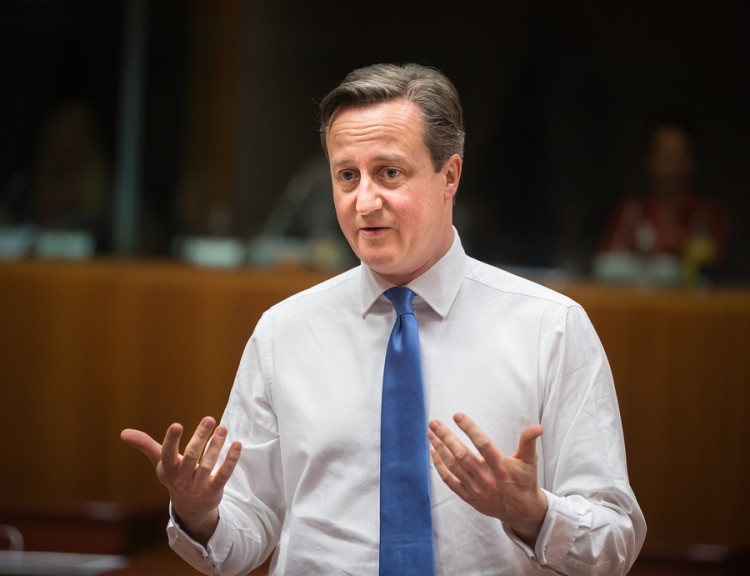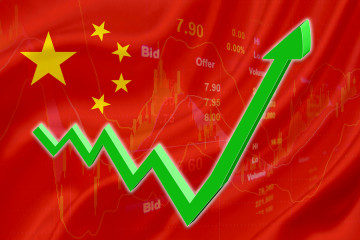Pound Soars as Exit Poll Predicts Tory Win; Asian Bonds Rebound

©2015 Bloomberg News
NO0ARK6KLVRG
(Bloomberg) — The pound jumped as an exit poll indicated the U.K. Conservative Party will retain power after elections, quelling concern over the prospect of protracted coalition negotiations. Asian bonds tracked a recovery in Treasuries, while most stocks rose ahead of U.S. labor market data.
Sterling jumped more than 1 percent against the dollar and the euro, trading at $1.54 by 9:59 a.m. in Tokyo amid its biggest climb in seven weeks. Yields on 10-year debt from Japan to Australia dropped at least one basis point with benchmark Treasury rates. The MSCI Asia Pacific Index rose 0.1 percent, trimming its second weekly retreat, as Japanese and Australian shares rallied. U.S. index futures were little changed. Oil in New York headed for its first weekly decline since March.
The poll gave the Conservatives 316 of the parliament’s 650 seats, with the Labour Party trailing on 239 seats. Should the results bear out, Conservative leader David Cameron would win his second term as prime minister. While China posts trade data Friday, traders are waiting for the monthly U.S. payrolls report, which is seen as key to determining the likely timeline for higher interest rates in the world’s largest economy.
“The market was expecting a messier, closer-run outcome in the exit poll,” Daragh Maher, a foreign-exchange strategist at HSBC Holdings Plc in London, said by instant message. “The fact that it signaled a clear upside surprise for the Conservatives has helped the pound on two fronts. Perhaps the market was a bit short pound into the poll expecting a tight call, and now that is being unwound.”
FTSE Forecast
The pound added 1.1 percent to 73.07 pence per euro, and gained against all 16 major peers tracked by Bloomberg. The FTSE 100 Index may open 70 points higher Friday should the exit poll prove accurate, Joshua Raymond, chief market strategist at City Index in London, wrote in a Tweet. The index closed at 6,886.95 Thursday, the lowest level since April 2.
In the run-up to the election, the Conservatives focused on their economic credentials, with opinion polls showing them to be the the most-trusted party on that subject. Even so, some investors voiced concern that the party’s pledge to hold a referendum on Britain’s membership of the European Union may undermine investment and hurt the pound. Results for individual seats will be announced through the night in the U.K. The euro lost 0.2 percent to $1.1249 in a second day of declines. Debt markets turned positive after a rout that erased more than $400 billion from global bonds in two weeks.
Bonds Rally
Yields on Japanese government notes due in a decade fell one basis point, or 0.01 percentage point, to 0.42 percent after jumping seven basis points Thursday. Similar maturity Australian bonds yielded 2.87 percent, with rates down 12 basis points in their first decline since April 27. Rates on New Zealand and South Korean debt fell at least two basis points. Treasuries cemented their rebound, with 10-year yields down one basis point to 2.17 percent after slipping six basis points Thursday. The declines trimmed their advance in the week to six basis points. “We’re seeing a rebound off some selling that took place recently,” Bill Schultz, who oversees $1.2 billion as chief investment officer at McQueen, Ball & Associates in Bethlehem, Pennsylvania, said by phone. “The next trend will be set by whatever the employment numbers dictate.” U.S. employers probably added 228,000 workers to nonfarm payrolls in April, after a 126,000 increase in March, according to economists surveyed by Bloomberg. Federal Reserve policy makers are monitoring labor data to determine the timing of higher borrowing costs after economic growth slowed in the first quarter for reasons the central bank called “transitory.”
China Futures
Japan’s Topix index added 0.6 percent after slipping 0.7 percent on Thursday, its first day of trading this week following a three-day market holiday. The S&P/ASX 200 Index in Sydney rose 0.6 percent, rallying from a three-month low, while the Kospi index in Seoul was little changed.
Futures on Hong Kong’s Hang Seng Index and the Hang Seng China Enterprises Index, a gauge of mainland stocks listed in the city, both increased 0.3 percent in most recent trading. FTSE China A50 Index futures were also up 0.3 percent, with the Shanghai Composite Index on track for a weekly slump of 7.4 percent, its first drop since the start of March and the worst weekly slide since 2009. Alibaba Group Holding Inc. jumped 7.5 percent in New York after reporting a 45 percent increase in quarterly revenue and replacing its chief executive officer. Yahoo! Inc., which owns a stake in the Chinese e-commerce company, gained 5.3 percent. The S&P 500 added 0.4 percent Thursday after losing 1.6 percent over the previous two days.
Oil Markets
Global equities are still down about 1 percent this week after the selloff in government debt sparked by record-low yields in Germany that money managers have said appear unsustainable. At the same time, China’s economy has slowed, while a 51 percent rally in Brent crude since mid-January is adding to signs of inflation. Brent added 0.2 percent to $65.70 a barrel, cutting its drop in the week to 1.1 percent, while West Texas Intermediate oil rose to $59.03 after tumbling the most in a month on Thursday. WTI is down 0.2 percent in the week, on track for its first weekly retreat since March amid signs U.S. producers are preparing to boost drilling after a recovery in prices.
–With assistance from Lukanyo Mnyanda in Edinburgh and Paul Dobson in London.
To contact the reporters on this story: Emma O’Brien in Wellington at eobrien6@bloomberg.net; David Goodman in London at dgoodman28@bloomberg.net To contact the editors responsible for this story: Emma O’Brien at eobrien6@bloomberg.net John McCluskey







No Comment